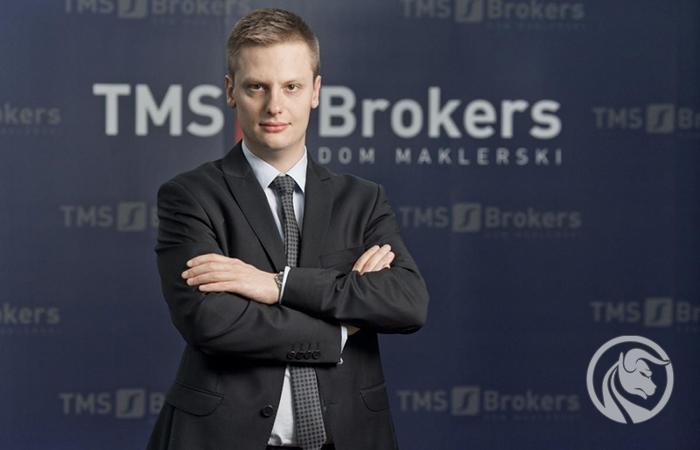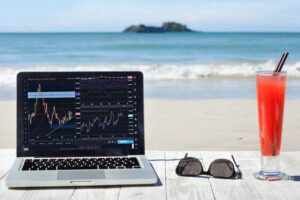"Correct assessment of the situation does not guarantee success" - Bartosz Sawicki on the work of an analyst.
Bartosz Sawicki is another hero of the interview series in which we want to discover the meanders of the analyst's work on the currency market. He currently works as head of the TMS Brokers analytical team. It is worth adding that this year's winner of the award for the best analyst at the gala Invest Cuffs, and his forecasts have been repeatedly appreciated by Bloomberg or the Parkiet newspaper. I invite you to familiarize yourself with his view of market reality, and thank you Bartosz for his inspiring interview.
Be sure to read: "You have to trust yourself" - Interview with Dorota Sierakowska
1. Many of our readers are interested in stories - first of all, the beginnings of a career and interests of famous analysts. Could you tell us where your interest in the markets came from?
In kindergarten I watched "Wall Street" with Michael Douglas. Then I understood what I want to do in my life. Of course, I `m joking. A frequent (typical) path from the stock market to the currency market in my case did not quite take place. I have always been particularly interested in socio-economic sciences, issues related to political transformation. This way I got to the subject of currency crises, international finance, and consequently the currency market. Before I started my career in the financial industry, I cooperated with Gazeta Giełdy Parkiet. There, I caught the bug for good and became more interested in the capital market, getting to know it from the inside out: conversations with company managements, visits to the WSE.
2. Could you please tell us what your "typical" day at work looks like?
Financial markets are a passion, and the work of an analyst requires full commitment and reconciliation with life in the rhythm set by financial markets. Usually, immediately after waking up I check the course of quotations and the most important news from the world. Thanks to this, I don't come to the office "green", but with a bit of reflection. Apart from events such as FOMC meetings, the morning hours are always the most intense and busy for my team. We publish the first reports and comments on the TMS NonStop analytical website before 8: 00. Already at 8: 30 we run morning webinars for our clients "Market Espresso". In a word: from the morning at high speed. Of course in the afternoon when "London goes to lunch" there is a moment of breath. The principle is simple: the amount and intensity of our work dictates the intensity of market events and market volatility. It also adds an element of unpredictability. Corporate and administrative obligations cannot be omitted. I have been the head of the Analysis Department at TMS Brokers for 6 years. It also involves a lot of meetings, but also documents and reports to be completed.
3. The profession of analyst is inherent in publishing your analyzes, which puts you at risk of criticism in the event of failure. Did you ever, especially at the beginning of your career, be bothered by unfavorable comments? How do you approach this?
I will quote an anecdote from my journalistic episode. The first day in the editorial office I had to write a text about a small company, before I did not even know its name. Nothing complicated, a short report from the result conference, but for a rookie studying economics it was a huge challenge. Proverbial jump into deep water. When I was holding the newspaper with my own text the next day, I felt pride. Exposure to the public quickly became the norm, and the episode of work in the newspaper made media relations one of my favorite parts of my duties.
At the same time, working on financial markets, we must accept the fact that we will not always be right, and even that the correct assessment of the situation does not guarantee success. I believe that - like investors - we must draw conclusions from failures, but not ponder them. We should think about stop loss as a deliverance from an incorrect investment decision and minimizing the loss, not as a failure.
4. Do you invest in your account? Maybe you have such a transaction that you particularly remember?
The combination of EU and national regulations and internal regulations of TMS Brokers practically takes away the opportunity to invest on your own account. The more so because I have a portfolio of investment recommendations for our clients "Day Chart". As part of it, I issue dozens of recommendations a year. In recent weeks, the purchase recommendation has been particularly strong in my memory EUR / USD during the Mario Draghi press conference. It required rapid assessment of the situation under high stress. It also concerned the moment of closing the model transaction, which took place after an hour.
5. At the beginning of our investment path, we often face the dilemma of what kind of analysis to choose. Tell me how you analyze markets? Are you a supporter of technical or fundamental analysis? Or maybe you have a golden mean between them?
There are probably a thousand different jobs on the labor market, whose name includes analysis. I think that the core of our work is better reflected by the term currency strategist. The way we operate is best described by the example of the recommendation already cited. On the one hand, we thought that the ECB president had already said everything that could threaten the single currency. At the same time, despite a sharp decline, it did not break an important hole. It was only the combination of both observations that turned into a transaction idea. Our view on foundations, technical situation, market positioning, sentiment and behavioral finance are specific filters through which we pass every investment idea.
6. In a word, you have a fairly broad and flexible approach to market analysis. In one of the interviews you said that the raw material market is your "little horse". In your opinion, does it have a chance for greater attention among investors in the near future?
The raw material market is one of the areas he deals with professionally. I am passionate about him, but I don't put him above the currency market. This one has been and will be in the center of my attention. Returning to the commodity markets: they are characterized by long trends and strong corrections. They are susceptible to supply and demand shocks. At the moment, in the case of particularly close agricultural crops and soft commodities, the long-term oversupply of individual goods prevails. It results in high stocks and low prices. I think that only moving to a deficit state (probably sugar is the closest to it) will trigger trends with a power that attracts a wider group of investors, but I don't think they will permanently leave the niche. Such an assessment is confirmed, for example, by the increase in investment popularity of gold and other precious metals over the last year. The trend works like a magnet.
7. Finally, a very classic question. What advice would you give to a person who dreams of becoming an analyst? Are there skills, character traits or temperaments that guarantee success in this industry?
To be objective, in response to this question I would like to give more based on the careers I observed a dozen people who at the young age did internships in my Department than my own experience. Work culture and ethics are very important. For example, those responsible for macroeconometric forecasting of economic indicators must be reconciled with the fact that part of their responsibilities at the start of their career will be the tedious construction of databases. Do not put equal sign "investor = analyst." When investing on own account, we can do it based on any methods. However, a technical analyst cannot say that he will not study any theory at all. Of course, it may not use the cloud Ichimoku, but this method should be included in the available instruments. Thirdly, analysts must remember that they are not independent entities: we often create content for individual investors. They should be understandable and accessible.
Thank you for the conversation!























![Forex Club – Tax 9 – Settle tax on a foreign broker [Download the Application] Forex Club - Tax 9](https://forexclub.pl/wp-content/uploads/2024/02/Forex-Club-Podatek-9-184x120.jpg?v=1709046278)
![Trading View platform – solutions tailored to the needs of traders [Review] trading view review](https://forexclub.pl/wp-content/uploads/2024/03/trading-view-recenzja-184x120.jpg?v=1709558918)
![How to connect your FP Markets account to the Trading View platform [Guide] fp markets trading view](https://forexclub.pl/wp-content/uploads/2024/02/fp-markets-trading-view-184x120.jpg?v=1708677291)
![How to invest in ChatGPT and AI? Stocks and ETFs [Guide] how to invest in chatgpt and artificial intelligence](https://forexclub.pl/wp-content/uploads/2023/02/jak-inwestowac-w-chatgpt-i-sztuczna-inteligencje-184x120.jpg?v=1676364263)


![Izabela Górecka – “Success on the market depends not only on knowledge, but also on emotional stability” [Interview] Izabela Górecka - interview](https://forexclub.pl/wp-content/uploads/2024/04/Izabela-Gorecka-wywiad-184x120.jpg?v=1713870578)
![WeWork – the anatomy of the collapse of a company valued at $47 billion [WeWork, part II] wework bankruptcy story](https://forexclub.pl/wp-content/uploads/2024/04/wework-bankructwo-historia-184x120.jpg?v=1711729561)
![Adam Neumann – the man who screwed up Softbank [WeWork, part AND] adam neumann wework](https://forexclub.pl/wp-content/uploads/2024/04/adam-neumann-wework-184x120.jpg?v=1711728724)





![How to transfer shares to another brokerage office [Procedure description] how to transfer shares to another brokerage house](https://forexclub.pl/wp-content/uploads/2024/03/jak-przeniesc-akcje-do-innego-biura-maklerskiego-184x120.jpg?v=1709556924)
![The most common mistakes of a beginner trader - Mr Yogi [VIDEO] Scalping - The most common mistakes of a beginner trader - VIDEO](https://forexclub.pl/wp-content/uploads/2024/03/Scalping-Najczestsze-bledy-poczatkujacego-tradera-VIDEO-184x120.jpg?v=1711601376)
![Learning patience: No position is also a position - Mr Yogi [VIDEO] Scalping - Learning patience - No position is also a position - VIDEO](https://forexclub.pl/wp-content/uploads/2024/03/Scalping-Nauka-cierpliwosci-Brak-pozycji-to-tez-pozycja-VIDEO-184x120.jpg?v=1710999249)
![When to exit a position and how to minimize losses - Mr Yogi [VIDEO] Scalping - When to exit a position and how to minimize losses - VIDEO](https://forexclub.pl/wp-content/uploads/2024/03/Scalping-Kiedy-wyjsc-z-pozycji-i-jak-minimalizowac-straty-VIDEO-184x120.jpg?v=1710336731)





![Where to look for investment opportunities? Forecasts for the XNUMXth quarter [Download Ebook] forecasts for the fourth quarter](https://forexclub.pl/wp-content/uploads/2023/10/prognozy-na-iv-kwartal-300x200.jpg?v=1697785512)












